
April 29
1882 Birth: H.N. Werkman: Dutch artist and printer:
Soon after the German invasion of the Netherlands in May 1940, Werkman, together with his friend August Henkels and others, started the publication of a series of Hassidic stories from the legend of the Baal Shem Tov through their clandestine publishing house De Blauwe Schuit ("The Blue Barge"). The series of forty publications, designed and illustrated by Werkman, was a subtly rebellious commentary on the Nazi occupation, and a call for spiritual resistance. On March 13, 1945, Werkman was arrested by the German secret police, and on April 10 he and nine other prisoners were executed by a firing squad, only three days before Groningen and the region were liberated by the Allies. His confiscated paintings and prints were destroyed in a fire during the liberation.
1885 Birth: Egon Erwin Kisch: Czech journalist and author who wrote in German:
On February 28, 1933, the day after the Reichstag Fire, Kisch was one of many prominent opponents of Nazism to be arrested. He was briefly imprisoned in Spandau, but as a Czechoslovakian citizen, was expelled from Germany. His works were banned and burnt in Germany, but he continued to write for the Czech and émigré German press, bearing witness to the horrors of the Nazi takeover.
1901 Birth: Hirohito: 124th Emperor of Japan:
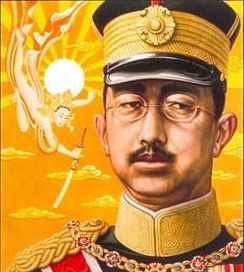
Hirohito . . . reigned during a period of internal unrest, foreign expansion, international war, and national defeat. As the occupant of Japan's throne for sixty-three years, he was the longest living ruler in modern history.
Childhood and education
He was the first son of Crown Prince Yoshihito, who later became the Taisho emperor, and the grandson of Mutsuhito, the Meiji emperor. Following long-established custom, Hirohito was separated from his parents shortly after birth . . . . until November 1904, when he returned to the Akasaka Palace, his parents' official residence. Even after his return to the palace, he was only allowed to see his mother once a week and hardly ever spent time with his father.
From early on, Hirohito was trained to act with the dignity, reserve, and sense of responsibility his future role would require and he grew into a shy and serious young boy. In April 1908 he was enrolled at the Gakushuin (Peers School) in a special class of twelve boys. The head of the school was General Maresuke Nogi, a celebrated soldier of the Russo-Japanese War . . . . He took a personal interest in the education of the young prince and attempted to introduce him to respect the virtues of hard work, the importance of devotion to the nation, and the practice of stoicism (the ability to ignore pleasure or pain).
In 1912 Mutsishito died and paved the way for Hirohito's father Yoshihito to take the throne. Hirohito then began an intense study of natural history. Under the guidance of his natural history tutor, he developed an interest in marine biology, a field in which he became an acknowledged expert.
Crown prince
On February 4, 1918, Hirohito became engaged to Princess Nagako . . . . The imperial wedding finally took place on January 26, 1924. The imperial couple later had five daughters, the first born in December 1926, and two sons, the first born in December 1933.
In March 1921 Hirohito, accompanied by a large group of attendants, set off for a tour of Europe. Never before had a crown prince of Japan visited countries abroad. Although Hirohito traveled in France, the Netherlands, and Italy, his visit to England made the deepest impression on him. He was attracted by the freedom and informality (without ceremony) of the English royal family.
On November 25, 1921, shortly after his return to Japan, Hirohito was appointed to serve as regent (acting ruler) for his father, who had begun to show increasing signs of mental instability. In December 1923 Hirohito escaped an attempt on his life by a young radical.
Emperor of a restless nation
Hirohito took the throne on December 25, 1926. He took as his reign name Showa ("Enlightened Peace"), and he was formally known as Showa Tenno. However, the choice of reign name would not hold true. Shortly after Hirohito became emperor, Japan's relations with the outside world began to fall apart. In 1927 Japanese army officers, without the agreement of Emperor Hirohito, sparked conflict with Manchuria and later occupied parts of that country. Hirohito soon found his military deeply involved on the Asian mainland.
The Manchurian incident ushered in a period of serious unrest within Japan. Young military officers plotted a series of unsuccessful takeovers as well as a number of successful assassinations (secretly planned murders). They hoped to overthrow parts of the government in order to establish a military regime that could govern in the name of "direct imperial rule." In other words, Hirohito would still be called emperor and would be the head of the government, but the military would actually be in control. Hirohito, however, saw himself as part of the state rather than a sole ruler, and believed that the leaders of government should be men of moderation and nonmilitaristic in outlook.
During the military revolt of February 26, 1936, elements of the First Division occupied large areas of downtown Tokyo, and assassination bands murdered many leading public officials. Emperor Hirohito urged swift end to the revolt and punished those involved. The uprising was crushed, and a number of ranking generals who were thought to have encouraged the rebels were forced into retirement.
Road to war
Nevertheless the country continued to drift toward war. In July 1937 hostilities with China broke out. During the late 1930s Hirohito's advisers in the palace urged him to stay away from direct involvement in politics or be forced to compromise the position of the imperial family. The emperor followed this advice, and agreed to whatever policies the governments decided upon.
There is every evidence that the emperor felt uneasy about the unfolding of events, particularly after 1940. He did not favor the alliance with Germany and Italy in World War II (1939–45), but he made no effort to oppose it. Similarly, he had grown distrustful of the judgments of the military leaders who kept assuring him of a quick end to the war in China. But when the final decision on war with the United States was made on September 6, 1941, he barely opposed it.
During the war Hirohito refused to leave the imperial palace at Tokyo, even after air raids began to demolish the city and fires destroyed many buildings on the palace grounds. He wished to share the hardships of his subjects.
Japan defeated
By the summer of 1945 it was clear that defeat was at hand. But the decision to surrender did not come until after atomic bombs were dropped on the Japanese towns of Hiroshima and Nagasaki. At a historic imperial conference on August 9, 1945, the emperor made clear his opinion in favor of surrendering to the allied powers led by the United States.
Following Japan's formal surrender in September 1945, there was much discussion about whether Emperor Hirohito should be punished as a war criminal. Hirohito himself frequently expressed his willingness to step down as a token of his responsibility for the war. But the U.S. authorities, including General Douglas MacArthur (1880-1964), decided that it would better serve the goals of Japanese stability to let him remain as ruler. On January 1, 1946, however, the emperor . . . gave up any claims to being a sacred ruler by issuing a law that denied his god-like status . . . .
Emperor's life as a mortal
During the years of the occupation and afterward, every effort was made to "democratize" the throne by having the emperor mingle with the people. Even though he was personally distant and somewhat awkward in public, the emperor nevertheless became a popular figure. Pictures of the imperial family and stories of their activities became a steady part of weekly magazine and newspaper copy.
A respected marine biologist with a number of books on that subject to his credit, Emperor Hirohito lived a modest, sober, and retired life when not involved in official functions. In 1972 he traveled to Europe and was met with hostile demonstrations. A 1975 trip to the United States resulted in a more friendly reception.
Hirohito died on January 7, 1989, at the age of eighty-seven. Symbolic of his interest in science and in modernizing his country, Hirohito reportedly was buried with his microscope and a Mickey Mouse watch.
[See: Countdown to Infamy: Timeline to Pearl Harbor.]
1915 World War I: List Regiment: Gefreiter Adolf Hitler's 16 Reserve Infantry Regiment occupy a position, at Fromelles (pictured above in a drawing by Hitler), which is on a level field with water channels, willow trees and willow stalks, in the distance towards the enemy lines lie an insignificant wood with barbed wire entanglements. Under the direction of their defense-minded commander, Lieutenant General Gustav Scanzoni von Lichtenfels, the regiment works ceaselessly day and night in the subsequent weeks, to further fortify their position at Fromelles. [For further details, Click here.]
1916 World War I: Various:
List Regiment: Gefreiter Adolf Hitler endures trench warfare in Flanders (Artois) with 3 Company, 16 Reserve Infantry Regiment. [For further details, Click here.]
British forces surrender at Kut, Mesopotamia:
In the single largest surrender of troops in British history to that time, some 13,000 soldiers under the command of Sir Charles Townshend give in on April 29, 1916, after withstanding nearly five months under siege by Turkish and German forces at the town of Kut-al-Amara, on the Tigris River in the Basra province of Mesopotamia (modern-day Iraq). [For further details, Click here]
1917 World War I: Various:
List Regiment: Gefreiter Adolf Hitler's 16 Reserve Infantry Regiment, 3 Company, participate in the Arras action, being redeployed east of Vimy Ridge. [For further details, Click here.]
Mutiny: Almost the entire French army, disheartened and exhausted after the disastrous Nivelle offensive, rebels in mutiny:
The third year of the war became one of the most dangerous for the Allies. France, and the French army, had faced the bulk of destruction and fighting on the Western Front. Discontent among the men began to emerge over their treatment in the army. Several key issues were at stake: poor food, no home leaves, limited rest opportunities, and a distrust of the French Generals who commanded them, became major problems. At one point during a major battle where over 100,000 men were killed or wounded, French replacements marched past their generals bleating like sheep. They believed that they were being led like animals to the slaughter. Under these conditions, French solider had faced enough. Discontent had spread thought out the army, and some 30,000 men decided to leave their trenches and walk home. Many men had not been home in the three years since the war had begun. Officers were allowed to go home on a regular basis, but lowly privates were not. [For further details, Click here.]
1918 World War I: List Regiment: Gefreiter Adolf Hitler's 16th RIR constructs fortified works in difficult defensive positions on an active front with German assault regiments near Fountaine (Montdidier). [For further details, Click here.]
1919 Versailles: The German delegation arrives, headed by Graf Ulrich von Brockdorff-Rantzau, the German foreign minister.
1930 The film All Quiet On The Western Front opens in the US:
All Quiet On The Western Front is a novel by Erich Maria Remarque, a German veteran of World War I, about the horrors of that war and also the deep detachment from German civilian life felt by many men returning from the front . . . . The book was banned during Nazi rule, the film's content was watered down to avoid a German boycott, and Remarque was stripped of his German citizenship in 1938."
1931 Birth: Frank Auerbach: German-born British artist:
Auerbach was born in Berlin of Jewish parents; his father was a lawyer and his mother a former art student. In 1939 he was sent to England to escape Nazism. His parents, who remained behind, died in concentration camps. He spent his childhood at a progressive boarding school, Bunce Court, at Lenham near Faversham, Kent, a school for Jewish refugee children. During the war years the school was evacuated to Shropshire. He attended St Martin's School of Art, London, from 1948 to 1952, and studied with David Bomberg in night classes at Borough Polytechnic. It was during this period that he developed a friendship with fellow student Leon Kossoff. Auerbach studied at the Royal College of Art from 1952 to 1955. He has used three principal models throughout his career: his wife Julia, who first posed for him in 1959; Juliet Yardley Mills ('J.Y.M.'), a professional model whom he met in 1957; and his close friend Estella (Stella) West ('E.O.W.'), the model for most of his nudes and female heads prior to 1973. Rarely leaving Britain, he lives and works in London and has had the same studio since the 1950s. [For further details, Click here]
1933 Zionism: David Ben-Gurion is attacked by members of BETAR, the Zionist youth movement, in Riga, Latvia. (THP)
1940 World War II: Norway: The King and the government fled northwards from Oslo, with the nation's gold reserves, to escape the blitzkrieg. A rearguard was formed, and the Allies began to evacuate. King Haakon escaped to Britain on HMS Glasgow along with many Norwegians, who fought as Free Norwegians throughout the war. [For further details, Click here]
1941 World War II: Iraq: A violent, pro-Fascist revolt is put down by British troops.
1942 World War II: War with Japan: The Japanese army captures the town of Lashio, cutting off the Burma Road between China and India.
1943 Various:
Resistance: Warsaw Ghetto: From the Underground AK newspaper Biuletyn Informacyjny:
A week ago the second stage began in the brutal annihilation of the Polish Jews. The Germans set about expelling the 40,000 Jews who still remained in Warsaw. The ghetto replied with armed struggle. The Jewish Fighting Organization opened a war of the weak against the strong. With scant forces, few arms and little ammunition, without water, blinded by smoke and fire, the Jewish fighters defended streets and individual houses. In the dusk they withdrew step by step, more because of the fire that had taken hold in the close-built houses than because of the enemy who was equipped with modern military arms. They considered it a victory if a part of those imprisoned in the ghetto were able to escape; it was a victory in their eyes to die while their hands still grasped arms.
World War II: Stalin to FDR:

I am sorry to say your reply did not reach me until April 27, whereas on April 25 the Soviet Government was compelled to interrupt relations with the Polish Government. As the Polish Government for nearly two weeks, far from ceasing a campaign hostile to the Soviet Union and beneficial to none but Hitler, intensified it in its press and on the radio, Soviet public opinion was deeply outrages by such conduct, and hence the Soviet Government could no longer defer action. It may well be that Mr. Sikorski himself has no intention of collaborating with the Hitler gangsters. I should be happy to see this surmise borne out in facts. But my impression is that certain pro-Hitler elements - either inside the Polish Government or its environment - have induced Mr. Sikorski to follow them, with the result that the Polish Government has come to be, possibly against its own will, a tool in Hitler's hands in the anti-Soviet campaign of which you are aware. I, too, believe that Prime Minister Churchill will find ways to bring the Polish Government to reason and help it proceed henceforth in a sprit of common sense. I may be wrong, but I believe that one of our duties as Allies is to prevent this or that Ally from taking hostile action against another Ally to the joy and benefit of the common enemy. As regards Polish subjects in the USSR and their future, I can assure you that Soviet Government agencies have always treated and will continue to treat them as comrades, as people near and dear to us. It should be obvious that there never has been, nor could have been, any question of their being deported from the USSR. If, however, they themselves wish to leave the USSR, the Soviet Government agencies will not hinder them, just as they have never done, and will, in fact, try to help them.
1944 World War II: War in the Pacific: US forces attack Truk in the Caroline Islands, dropping more than 800 tons of bombs.
1945 World War II: Various:
In the Bunker
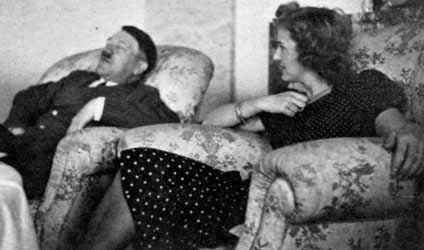
Hitler and Eva Braun exchange marriage vows: A minor official named Walter Wagner—pulled from his Volkssturm unit on the front lines—conducts the ceremony. Goebbels is witness for Hitler and Bormann for Eva. Only eight guests are allowed to attend: Bormann, Joseph and Magda Goebbels, Gerda Christian, Chief Adjutant Bergdorf, General Krebs, Arthur Axmann, head of the Hitler Youth, and Fraulein Manzialy, Hitler's cook. The rest of the staff wait outside to congratulate the newly wedded couple as the phonograph is wound up and the one record remaining in the Bunker, 'Red Roses,' is set to spinning. Junge will later tell Gitta Sereny:
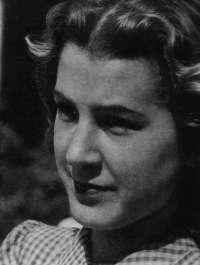
I joined the party in the study (after typing the last testaments). I sat down with them around the table and ate little sandwiches and drank champagne as they apparently had been doing for quite awhile. Nobody said anything. We couldn't very well toast their future.
Walter Wagner fades back into obscurity, never to be heard from again. Note: One wonders if Wagner was given a last glass of bubbly before being sent back to the front. (Shirer, Payne, Sereny) [See: The Last Days of the Third Reich.]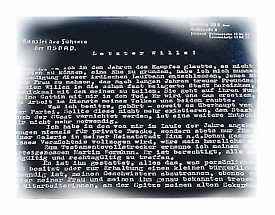
Hitler signs his last political testament (at 4 AM) which had been quickly typed by Traudl Junge, one of his personal secretaries.
Since 1914, when as a volunteer, I made my modest contribution in the World War which was forced upon the Reich, over thirty years have passed. In these three decades, only love for my people and loyalty to my people have guided me in all my thoughts, actions, and life. They gave me the strength to make the most difficult decisions, such as no mortal has yet had to face. I have exhausted my time, my working energy, and my health in these three decades. is untrue that I or anybody else in Germany wanted war in 1939. It was desired and instigated exclusively by those international statesmen who were either of Jewish origin or working for Jewish interests. I have made so many offers for the reduction and elimination of armaments, which posterity cannot explain away for all eternity, that the responsibility for the outbreak of this war cannot rest on me. Furthermore, I never desired that after the first terrible World War a second war should arise against England or even against America. Centuries may pass, but out of the ruins of our cities and monuments of art there will arise anew the hatred for the people who alone are ultimately responsible: International Jewry and its helpers! As late as three days before the outbreak of the German-Polish War, I proposed to the British Ambassador in Berlin a solution for the German-Polish problem: similar to the problem of the Saar area, under international control. This offer cannot be explained away, either. It was only rejected because the responsible circles in English politics wanted the war, partly in the expectation of business advantages, partly driven by propaganda promoted by international Jewry. But I left no doubt about the fact that if the peoples of Europe were again only regarded as so many packages of stock shares by these international money and finance conspirators, then that race, too, which is the truly guilty party in this murderous struggle would also have to be held to account: the Jews! I further left no doubt that this time we would not permit millions of European children of Aryan descent to die of hunger, nor millions of grown-up men to suffer death, nor hundreds of thousands of women and children to be burned and bombed to death in their cities, without the truly guilty party having to atone for its guilt, even if through more humane means. [For the full text, Click here.]
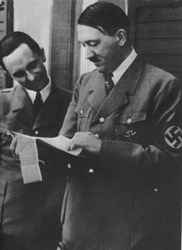
Hitler signs his last will and personal testament (also typed by Traudl Junge):
As I did not consider that I could take responsibility, during the years of struggle, of contracting a marriage, I have now decided, before the closing of my earthly career, to take as my wife that girl who, after many years of faithful friendship, entered, of her own free will, the practically besieged town in order to share her destiny with me. At her own desire she goes as my wife with me into death. It will compensate us for what we both lost through my work in the service of my people. What I possess belongs - in so far as it has any value - to the Party. Should this no longer exist, to the State; should the State also be destroyed, no further decision of mine is necessary. My pictures, in the collections which I have bought in the course of years, have never been collected for private purposes, but only for the extension of a gallery in my home town of Linz on Donau. It is my most sincere wish that this bequest may be duly executed. I nominate as my Executor my most faithful Party comrade, Martin Bormann. He is given full legal authority to make all decisions. He is permitted to take out everything that has a sentimental value or is necessary for the maintenance of a modest simple life, for my brothers and sisters, also above all for the mother of my wife and my faithful co-workers who are well known to him, principally my old Secretaries Frau Winter etc. who have for many years aided me by their work. I myself and my wife - in order to escape the disgrace of deposition or capitulation - choose death. It is our wish to be burnt immediately on the spot where I have carried out the greatest part of my daily work in the course of a twelve years' service to my people." Signed as witnesses: Dr. Joseph Goebbels, Martin Bormann, Colonel Nicholaus von Below; Given in Berlin, 29th April 1945, 4:00 a.m. Signed: Adolf Hitler
Soviet troops drive toward Hitler's bunker in three main attacks. Heinrich Mueller, Bernd von Freytag-Loringhoven, Gerhardt Boldt, and Rudolf Weiss take their final leave of the Fuehrerbunker.
Churchill to Stalin:
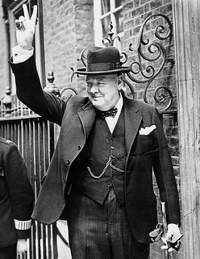
I have just received a telegram from Field-Marshal Alexander that after a meeting at which your officers were present the Germans accepted the terms of unconditional surrender presented to them and are sending the material clauses of the instrument of surrender to General von Vietinghoff, with the request to name the date and hour at which conclusion of hostilities can be made effective. It looks therefore as if the entire German forces south of the Alps will almost immediately surrender.
Churchill to Stalin:
We are all shocked that you should think we would favor a Polish Government hostile to the Soviet Union. This is the opposite of our policy. But it was on account of Poland that the British went to war with Germany in 1939. We saw in the Nazi treatment of Poland a symbol of Hitler's vile and wicked lust of conquest and subjugation, and his invasion of Poland was the spark that fired the mine. The British people do not, as is sometimes thought, go to war for calculation, but for sentiment. They had a feeling which grew up in years that with all Hitler's encroachments and doctrine he was a danger to our country and to the liberties which we prize in Europe, and when after Munich he broke his word so shamefully about Czechoslovakia even the extremely peace-loving Chamberlain gave our guarantee against Hitler to Poland. When that guarantee was invoked by the German invasion of Poland the whole nation went to war with Hitler, unprepared as we were. There was a flame in the hearts of men like that which swept your people in the noble defense of their country from a treacherous, brutal, and at one time it almost seemed, overwhelming German attack. This British flame burns still among all classes and parties in this Island, and in its self-governing Dominions, and they can never feel this war will have ended rightly unless Poland has a fair deal in the full sense of sovereignty, independence, and freedom, on the basis of friendship with Russia. It was on this that I thought we had agreed at Yalta . . . .
There is not much comfort in looking into a future where you and the countries you dominate, plus the Communist Parties in many other States, are all drawn up on one side, and those who rally to the English-speaking nations and their associates, or Dominions on the other. It is quite obvious that their quarrel would tear the world to pieces and that all of us leading men on either side who had anything to do with that would be shamed before history.
Operation Manna commences: Lancaster bombers of the Royal Air Force drop food into parts of the occupied Netherlands, with the acquiescence of the occupying German forces, to feed people who are in danger of starvation in the Dutch famine.
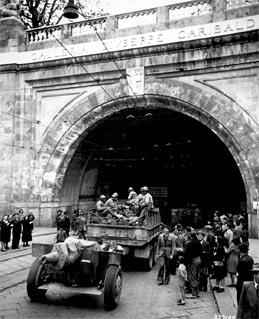
Italy: An unconditional surrender of the German armies in Italy is signed at Caserta; Venice and Mestre are captured by the Allies.
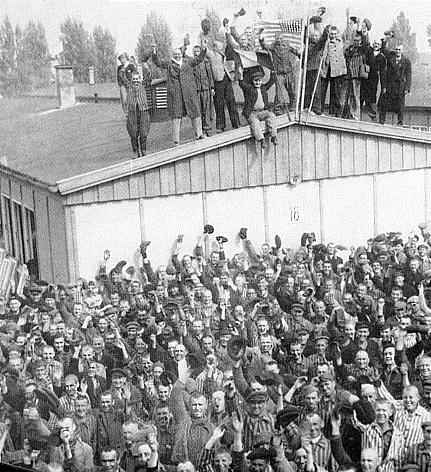
The U.S. Seventh Army's 45th Infantry Division liberates Dachau, the first concentration camp established by Germany's Nazi regime. A major Dachau subcamp was liberated the same day by the 42nd Rainbow Division.
Established five weeks after Adolf Hitler took power as German chancellor in 1933, Dachau was situated on the outskirts of the town of Dachau, about 10 miles northwest of Munich. During its first year, the camp held about 5,000 political prisoners, consisting primarily of German communists, Social Democrats, and other political opponents of the Nazi regime. During the next few years, the number of prisoners grew dramatically, and other groups were interned at Dachau, including Jehovah's Witnesses, Gypsies, homosexuals, and repeat criminals. Beginning in 1938, Jews began to comprise a major portion of camp internees.
Prisoners at Dachau were used as forced laborers, initially in the construction and expansion of the camp and later for German armaments production. The camp served as the training center for SS concentration camp guards and was a model for other Nazi concentration camps. Dachau was also the first Nazi camp to use prisoners as human guinea pigs in medical experiments. At Dachau, Nazi scientists tested the effects of freezing and changes to atmospheric pressure on inmates, infected them with malaria and tuberculosis and treated them with experimental drugs, and forced them to test methods of making seawater potable and of halting excessive bleeding. Hundreds of prisoners died or were crippled as a result of these experiments.
Thousands of inmates died or were executed at Dachau, and thousands more were transferred to a Nazi extermination center near Linz, Austria, when they became too sick or weak to work. In 1944, to increase war production, the main camp was supplemented by dozens of satellite camps established near armaments factories in southern Germany and Austria. These camps were administered by the main camp and collectively called Dachau.
With the advance of Allied forces against Germany in April 1945, the Germans transferred prisoners from concentration camps near the front to Dachau, leading to a general deterioration of conditions and typhus epidemics. On April 27, 1945, approximately 7,000 prisoners, mostly Jews, were forced to begin a death march from Dachau to Tegernsee, far to the south. The next day, many of the SS guards abandoned the camp. On April 29, the Dachau main camp was liberated by units of the 45th Infantry after a brief battle with the camp's remaining guards.
As they neared the camp, the Americans found more than 30 railroad cars filled with bodies in various states of decomposition. Inside the camp there were more bodies and 30,000 survivors, most severely emaciated. Some of the American troops who liberated Dachau were so appalled by conditions at the camp that they machine-gunned at least two groups of captured German guards. It is officially reported that 30 SS guards were killed in this fashion, but conspiracy theorists have alleged that more than 10 times that number were executed by the American liberators. The German citizens of the town of Dachau were later forced to bury the 9,000 dead inmates found at the camp.
In the course of Dachau's history, at least 160,000 prisoners passed through the main camp, and 90,000 through the subcamps. Incomplete records indicate that at least 32,000 of the inmates perished at Dachau and its subcamps, but countless more were shipped to extermination camps elsewhere.
[See: Was the Holocaust Detrimental to Hitler's War Effort?]In the Bunker: The mood in the bunker now sank to zero-level. Despair was now written on everyone's face. All knew it was only a matter of hours before Hitler killed himself, and wondered what the future held for them after his death. There was much talk of the best methods of committing suicide. Secretaries, adjutants, and any others who wanted them had by now been given the brass-cased ampoules containing prussic acid supplied by Dr. Ludwig Stumpfegger, the SS surgeon who had joined the 'court' the previous October. Hitler's paranoia stretched now to doubts about the capsules. He had shown his Alsatian bitch Blondi more affection in recent years than any human being, probably including even Eva Braun. Now, as the end approached, he had the poison tested on Blondi. Professor Werner Haase was summoned from his duties in the nearby public air-raid shelter beneath the new Reich Chancellery building nearby. Shortly before the afternoon briefing on 29 April, aided by Hitler's dog attendant, Sergeant Fritz Tornow, he forced open the dogs jaws and crushed the prussic acid capsule with a pair of pliers. The dog slumped in an instant motionless to the ground. Hitler was not present. However, he entered the room immediately afterwards. He glanced for a few seconds at the dead dog. Then, his face like a mask, he left without saying anything and shut himself in his room.
In the Bunker: At noon, three copies of Hitler's the last will and political testament documents are sent by courier to Grand Admiral Doenitz, General Schoerner, and the Brown House in Munich, respectively. (Payne)
[See: Why Did Hitler Insist on No Surrender?]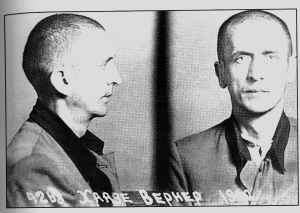
The mood in the bunker now sank to zero-level. Despair was now written on everyone's face. All knew it was only a matter of hours before Hitler killed himself, and wondered what the future held for them after his death. There was much talk of the best methods of committing suicide. Secretaries, adjutants, and any others who wanted them had by now been given the brass-cased ampoules containing prussic acid supplied by Dr. Ludwig Stumpfegger, the SS surgeon who had joined the 'court' the previous October. Hitler's paranoia stretched now to doubts about the capsules. He had shown his Alsatian bitch Blondi more affection in recent years than any human being, probably including even Eva Braun. Now, as the end approached, he had the poison tested on Blondi. Professor Werner Haase (above) was summoned from his duties in the nearby public air-raid shelter beneath the new Reich Chancellery building nearby. Shortly before the afternoon briefing on 29 April, aided by Hitler's dog attendant, Sergeant Fritz Tornow, he forced open the dogs jaws and crushed the prussic acid capsule with a pair of pliers. The dog slumped in an instant motionless to the ground. Hitler was not present. However, he entered the room immediately afterwards. He glanced for a few seconds at the dead dog. Then, his face like a mask, he left without saying anything and shut himself in his room.
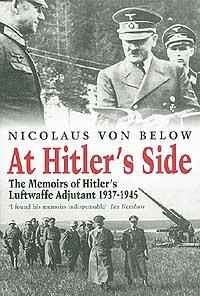
In the Bunker: At the afternoon situation conference, General Burgdorf requests that Hitler's Air Force adjutant, Colonel Nicolaus von Below, be allowed to leave the Bunker. Hitler acquiesces, and requests that von Below perform one last service to his Fuehrer; deliver a message to Keitel. After the conference, he dictates what has been called the last message Hitler will send from the Bunker:
The people and the Armed Forces have given their all in this long and hard struggle. The sacrifice has been enormous. But my trust has been misused by many people. Disloyalty and betrayal have undermined resistance throughout the war. It was therefore not granted to me to lead the people to victory. The Army General Staff cannot be compared with the General Staff in the First World War. Its achievements were far behind those of the fighting front. The efforts and sacrifices of the German people in this war have been so great that I cannot believe they have been in vain. The aim must still be to win territory in the West for the German people.
Note: The message will never be delivered as von Below will destroy it while wandering around behind enemy lines two days later. The version above—quoted from Payne—is recreated from von Below's memory, with no other corroborating documentation. (Payne, Kershaw)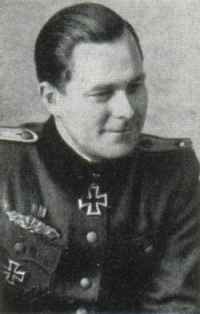
In the Bunker: Hitler shares his fears of being overcome with gas and captured by the Soviets with his pilot, Hans Baur:
The Russians know perfectly well that I am here in this bunker. I'm afraid they will use gas shells. During the war we produced a gas that could put a man to sleep for twenty-four hours. Our intelligence tells me that the Russians now have this gas too. The consequences would be unimaginable if they captured me alive. (Payne)
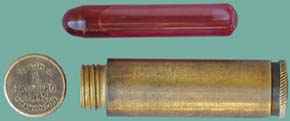
In the Bunker: At 6 PM, Hitler announces to his staff that he and his wife, Eva, are going to commit suicide together unless some miracle intervenes. He then passes out vials of cyanide. At 9 PM, the news of the murder and the public humiliation of Mussolini and his mistress reaches the Bunker. Hitler vows that he will not share a similar fate.
[See: Did Adolf Hitler Really Commit Suicide?]World War II: Hjalmar Schacht—who had been implicated in the July 20 Plot to assassinate Hitler—and arrested by the Gestapo, is now arrested by the US 9th Army. Note: Schacht will be acquitted at the first Nuremberg Trial.
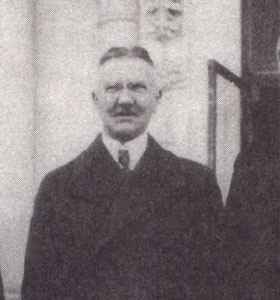
Ravensbrueck, Moabit, and finally the extermination camp of Flossenburg were his [Schacht's] stopping places. 'No one gets out alive from this camp,' Schacht whispered to his fellow prisoners when he was brought in. Through the open door of a shed in the camp, there was a view of the scaffolding of the gallows. Every night Schacht heard the screams and shots which left no doubt what was happening. Many a morning, as he took his exercise, he could count up to thirty dead being carried away on stretchers from the places of execution.
Only much later Schacht learned that the commandant of Flossenburg had been expressly ordered to shoot him as soon as the Allies came anywhere near the camp. But it did not come to that. In the face of imminent defeat the SS suddenly attempted to introduce a more humane treatment, perhaps in the hope of thereby saving themselves.
Thus Schacht, together with other prisoners, was transferred first to Dachau and later to Austria when the Americans advanced. As the transport halted at the Pragser Wildsee the Ninth Army liberated him, and with him a number of others who were internees and 'VIP prisoners' of Hitler . . . (among them: Pastor Martin Niemoeller, Miklos Kallay, Bruno Bettelheim, Kurt von Schuschnigg, Fritz Thyssen, Leon Blum, Nicholas von Horthy, Alext Kokosin, Franz Halder, Peter Churchill) . . . . "Why did Hitler put you in jail? Schacht was asked by the Americans. 'No idea,' answered the banker.
He also had no idea why he was not set free, but kept under arrest. He was well treated, he had excellent food, and was allowed to walk unguarded by the Pragser lake. But then he was moved again, and by various stages reached eventually the overcrowded prisoner-of-war camp Aversa near Naples. Hjalmar Schacht, the financial genius with the old-fashioned stand-up collar, had changed sides several times. Now he was on his way to the prison at Nuremberg.
In the Bunker: Late in the evening, General Krebs radios General Jodl with three terse questions from Hitler:
Request immediate report. Firstly of the whereabouts of Wenck's spearheads. Secondly of time intended to attack. Thirdly of the location of the Ninth Army. Fourthly of the precise place in which the Ninth Army will break through. Fifthly of the whereabouts of General Rudolf Holste's spearhead. (Kershaw)
1946 World War II: International Military Tribunal indicts Tojo Hideki:
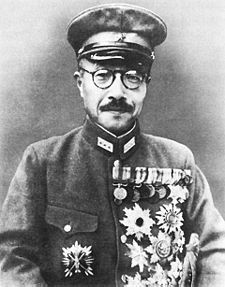
Tojo Hideki, wartime premier of Japan, is indicted by the International Military Tribunal for the Far East of war crimes. In September 1945, he tried to commit suicide by shooting himself but was saved by an American physician who gave him a transfusion of American blood. He was eventually hanged by the Americans in 1948 after having been found guilty of war crimes. (This Day in History)
1951 Death: Ludwig Wittgenstein: Austrian-born philosopher:
Until 1903, Ludwig was educated at home; after that, he began three years of schooling at the Realschule in Linz, a school emphasizing technical topics. Adolf Hitler was a student there at the same time, when both boys were 14 or 15 years old. When the Anschluss took place, Wittgenstein was now technically a German citizen, and a Jew under the German racial laws. While he found this intolerable, and started to investigate the possibilities of acquiring British or Irish citizenship (with the help of Keynes), which put his siblings Hermine, Helene and Paul (all still residing in Austria) in considerable danger. Wittgenstein's first thought was to travel to Vienna, but he was dissuaded by friends. Had the Wittgensteins been classified as Jews, their fate would have been no different from that of any other Austrian Jews (of approximately 600 in Linz at the end of the 1930s, for example, only 26 survived the war). Their only hope was to be classified as Mischlinge, officially Aryan/Jewish mongrels, whose treatment, while harsh, was less brutal than that reserved for Jews. This reclassification was known as a "Befreiung". The successful conclusion of these negotiations required the personal approval of Adolf Hitler. "The figures show how difficult it was to gain a Befreiung. In 1939 there were 2,100 applications for a different racial classification: the Fuehrer allowed only twelve." Gretl (an American citizen by marriage) started negotiations with the Nazi authorities over the racial status of their grandfather Hermann, claiming that he was the illegitimate son of an "Aryan". Since the Reichsbank was keen to get its hands on the large amounts of foreign currency owned by the Wittgenstein family, this was used as a bargaining tool. The required Befreiung was granted in August 1939. The amount signed over to the Nazis by the Wittgenstein family, a week or so before the outbreak of war, was 1.7 tonnes of gold. At current prices (late 2006), this amount of gold would be worth over $22 million.
1956 Death: Wilhelm Ritter von Leeb: German field marshal:
Field Marshal Wilhelm Ritter von Leeb played a major part in the initial campaigns of World War Two but paid the price for his failure to take Leningrad. As a result of this failure, Hitler placed Leeb on the retirement list.
Wilhelm Ritter von Leeb was born on September 5th 1876. In 1897 he joined the 4th Field Artillery Regiment and during World War One he served as an artillery officer.
Leeb stayed in the army after the end of the war. By 1929, he was a major general. In 1934, Leeb was appointed commander of the 2nd Gruppenkommando (Army Group Headquarters). However, shortly after this appointment, Leeb resigned his commission in protest at the influence of Nazi rules and regulations that had been imposed on the army.
When war started in September 1939, Leeb was recalled and given command of Army Group C. This army group was tasked with defending Nazi Germany's from a French invasion while much of her military might was directed against Poland.
When the attack on France came in May 1940, Leeb's army group played a major part in defeating the defenders who were based in the Maginot Line. For his part in the invasion of France, Leeb was promoted to field marshal on July 19th 1940. As part of 'Operation Barbarossa', Leeb was given the command of Army Group North. His primary task, after capturing the Baltic States, was Leningrad. Leeb's failure to capture the Soviet Union's second city proved to be his downfall. Hitler believed that the Red Army was torn with incompetence and that its defeat was simply taken as read. Hitler also believed that the Russian people would be unable to cope with the might of the German Army. Therefore, he was furious when Army Group North failed to capture Leningrad and he removed Leeb from his command. Leeb was placed on the retired list on January 18th 1942.
2004 World War II monument opens in Washington, DC:
On April 29, 2004, the National World War II Memorial opens in Washington, D.C., to thousands of visitors, providing overdue recognition for the 16 million U.S. men and women who served in the war. The memorial is located on 7.4 acres on the former site of the Rainbow Pool at the National Mall between the Washington Monument and the Lincoln Memorial. The Capitol dome is seen to the east, and Arlington Cemetery is just across the Potomac River to the west.
The granite and bronze monument features fountains between arches symbolizing hostilities in Europe and the Far East. The arches are flanked by semicircles of pillars, one each for the states, territories and the District of Columbia. Beyond the pool is a curved wall of 4,000 gold stars, one for every 100 Americans killed in the war. An Announcement Stone proclaims that the memorial honors those "Americans who took up the struggle during the Second World War and made the sacrifices to perpetuate the gift our forefathers entrusted to us: A nation conceived in liberty and justice." [For further details, Click here]
Edited by Levi Bookin (Copy editor)
levi.bookin@gmail.com



Click to join 3rdReichStudies

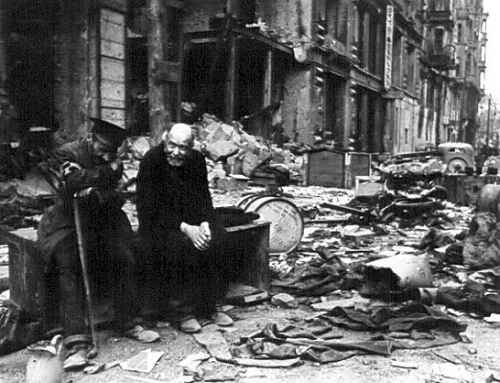
Please note that the list-owner and the moderator are not responsible for, and do not necessarily approve of, the random ads placed on our pages by our web server. They are, unfortunately, the price one pays for a 'free' website.
FAIR USE NOTICE: This site may contain copyrighted material the use of which has not always been specifically authorized by the copyright owner. We are making such material available in our efforts to advance understanding of historical, political, human rights, economic, democracy, scientific, environmental, and social justice issues, etc. We believe this constitutes a 'fair use' of any such copyrighted material as provided for in section 107 of the US Copyright Law. In accordance with Title 17 U.S.C. Section 107, the material on this site is distributed without profit to those who have expressed a prior interest in receiving the included information for research and educational purposes. If you wish to use copyrighted material from this site for purposes of your own that go beyond 'fair use', you must obtain permission from the copyright owner.